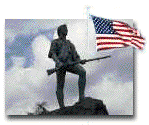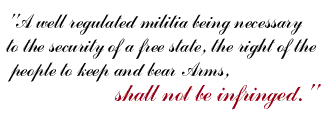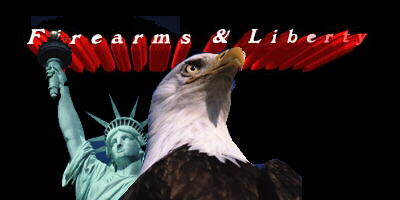Boneyard 420's Web World
 2nd Amendment
2nd Amendment 





"The defence of one's self, justly called the primary law of nature, is not, nor can it be abrogated by any regulation of municipal law."
--- James Wilson, Wilson, Of the Natural Rights of Individuals, in 2 The Works of James Wilson 335 (J.D. Andrews ed. 1896).
"Resistance to sudden violence, for the preservation not only of my person, my limbs, and life, but of my property, is an indisputable right of nature which I have never surrendered to the public by the compact of society, and which perhaps, I could not surrender if I would."
--- John Adams, Boston Gazette, Sept. 5, 1763,reprinted in 3 The Works of John Adams 438 (Charles F.
Adams ed., 1851).
The original intent and purpose of the Second Amendment was to preserve and guarantee, not grant the pre-existing right of individuals, to keep and bear arms. Although the amendment emphasizes the need for a militia, membership in any militia let alone a well regulated one, is not required to exercise the right to keep and bear arms.
Evidence of an Individual Right
In his popular edition of Blackstone's Commentaries on the Laws of England (1803), St. George Tucker, a lawyer, Revolutionary War militia officer, legal scholar, and later a U.S. District Court judge, wrote of the Second Amendment:
The right of the people to keep and bear arms shall not be infringed, and this without any qualification as to their condition or degree, as is the case in the British government.
In the appendix to the Commentaries, Tucker elaborates further:
This may be considered as the true palladium of liberty... The right of self-defense is the first law of nature; in most governments it has been the study of rulers to confine this right within the narrowest limits possible. Whenever standing armies are kept up, and the right of the people to keep and bear arms is, under any color or pretext whatsoever, prohibited, liberty, if not already annihilated, is on the brink of destruction.
The Pennsylvania Gazette, Feb. 20, 1788, while the states were considering ratification of the Constitution, Tench Coxe wrote:
Who are the militia? are they not ourselves. Is it feared, then, that we shall turn our arms each man against his own bosom. Congress have no power to disarm the militia. Their swords, and every other terrible implement of the soldier, are the birth-right of an American...The unlimited power of the sword is not in the hands of either the federal or state governments but, where I trust in God it will ever remain, in the hands of the people.

"What country can preserve its liberties if it's rulers are not warned
from time to time that the people preserve the spirit of resistance?
LET THEM TAKE ARMS"
- Thomas Jefferson
The citation comes from Jefferson: Letter to Wm.S. Smith, 1787, In Jefferson, ON DEMOCRACY 20 (S. Padover ed. 1939)